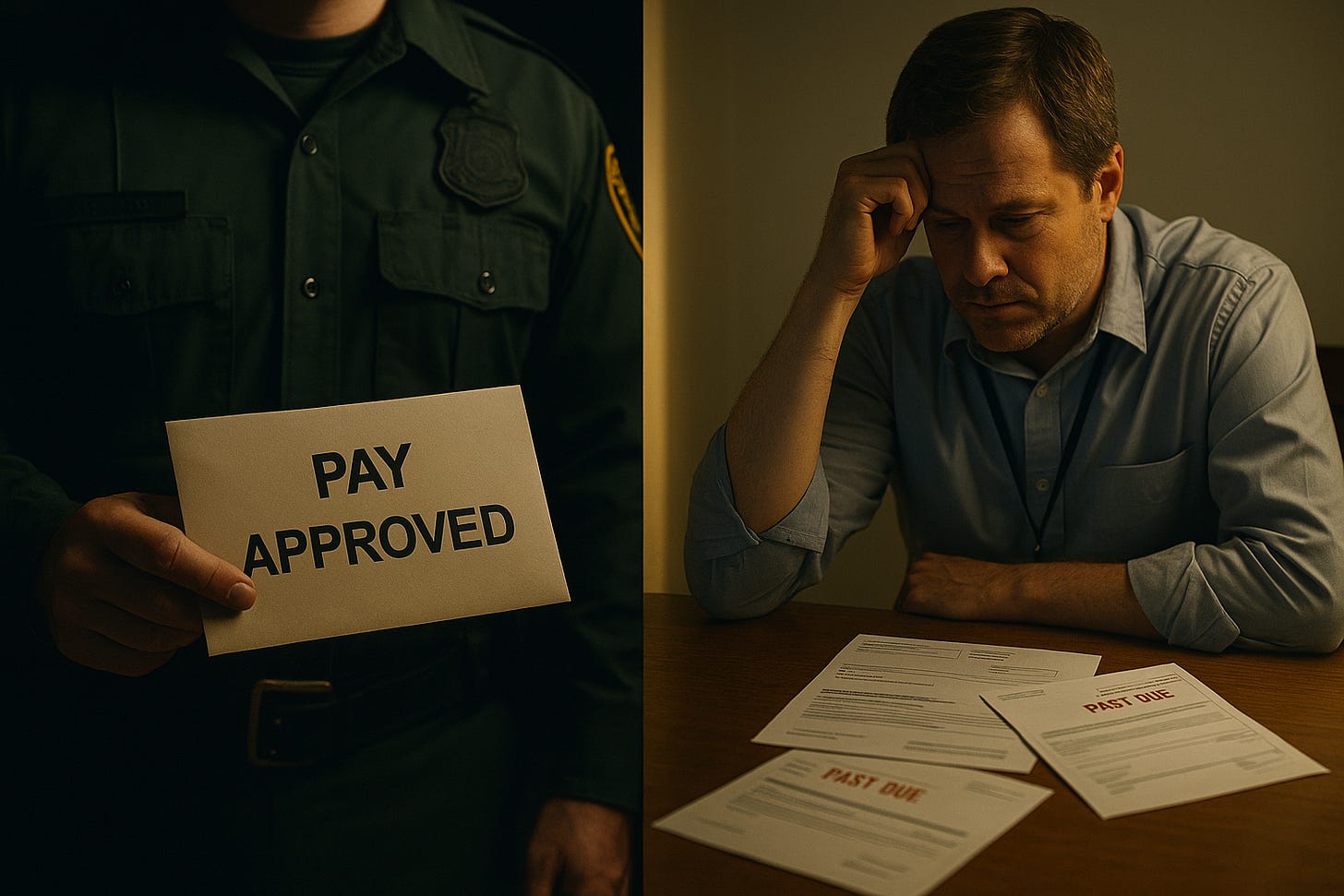Selective Obedience
The quiet economics of authoritarian control
This essay continues the investigation begun in “The Payroll of Power.” Together they form a two-part examination of Trump’s new political economy—where selective payment replaces policy, and obedience becomes the only guaranteed income. “The Payroll of Power” exposed the act; “Selective Obedience” deciphers the method.
A paid federal officer and an unpaid civilian worker during a shutdown, representing selective government favoritism.
When a democracy begins to tilt toward authoritarianism, the signs are rarely theatrical. They are bureaucratic. Hidden inside budget lines, funding directives, and payroll exceptions, you can often find the moral mathematics of a regime taking shape.
The latest example comes directly from the Department of Homeland Security. While the federal government remains shut down and hundreds of thousands of employees go unpaid, the Trump administration has promised full compensation to more than 70,000 federal law-enforcement officers — primarily those at ICE, the Border Patrol, the Secret Service, and selected divisions of the Transportation Security Administration.
The justification is bureaucratic jargon: “continuity of critical operations.” The reality is political selection. The administration has ensured that those enforcing its most aggressive domestic priorities — immigration crackdowns, urban “law-enforcement surges,” fentanyl interdictions — will receive uninterrupted paychecks. Everyone else, from scientists to safety inspectors, will simply have to wait.
This selective payroll is more than administrative convenience. It is a statement of philosophy.
Authoritarian prioritization
State violence is funded; civic infrastructure is starved. The federal workers who process benefits, safeguard food and water, or regulate corporate pollution are told to endure the shutdown. The officers who raid, detain, and patrol are told they are “essential.” The word has lost its neutrality — it now means politically useful.
Trump’s presidency has long treated coercive power as the only legitimate form of governance. Every government shutdown becomes an opportunity to rehearse that worldview: weaken the civilian side of the state and reward the armed one. Over time, the habit becomes structure.
Political favoritism
There is also the unmistakable smell of patronage. These “superchecks” are not merely wages; they are tokens of belonging. They tell a specific segment of the bureaucracy — uniformed, armed, and ideologically aligned — that loyalty will be remembered.
During previous shutdowns, even essential security personnel went unpaid until Congress acted. This time, the administration intervened to guarantee its enforcers’ comfort while everyone else tightens belts. The difference is intent: in a normal democracy, payroll decisions aim to minimize harm; in an authoritarian drift, they aim to reward loyalty.
Financial coercion
By shielding ICE and CBP from the pain of lost income, the administration teaches a simple lesson: faithfulness is remunerated. For the hundreds of thousands of others who continue working without pay, the inverse lesson holds — neutrality or disapproval carries a cost.
This is how a government converts financial management into ideological training. You do not need censorship or mass firings when you can achieve obedience through the pocketbook. Every agency learns to anticipate the next cutoff. Every employee learns to calculate risk before conscience.
Shadow funding
Perhaps the most telling element is the mystery of the money itself. ICE and CBP are almost entirely funded through annual appropriations that expired when the shutdown began. DHS has offered no explanation for where these new paychecks originate. “Reclassification” is the official euphemism. In plain English: the administration is shifting money in ways that obscure accountability.
Such maneuvers may seem technical, but they reveal the infrastructure of impunity. If enforcement salaries can be conjured while the rest of government goes dark, it means the White House has already built parallel channels of fiscal control — invisible to oversight, responsive only to political will.
Geographic signaling
Finally, there is geography. The administration’s own communications confirm that this newly funded enforcement surge will focus on Democratic-leaning cities such as Chicago. In effect, the government shutdown doubles as a strategic mobilization: a redistribution of federal muscle toward regions that resist the president most openly. The message is unmistakable — dissenting jurisdictions will be met not with debate, but with force.
The pattern beneath the policy
Put together, these strands describe the anatomy of selective obedience. It is not simply that some are paid and others are not; it is that payment itself becomes the mechanism of control. By rewarding the obedient and depriving the neutral, the administration transforms ordinary governance into a loyalty economy.
This is how the democratic state is quietly hollowed out. Not by decrees or coups, but by budget memos — by who gets a check and who does not. A shutdown is supposed to halt government; in this one, it has revealed which parts of government the president truly considers alive.
In authoritarian systems, cash flow and command flow are the same thing. The dollar becomes the leash.
Selective Obedience is therefore less a scandal than a signal. It shows a president not improvising, but refining: learning how to finance obedience without ever declaring it. And if the rest of the federal workforce remains unpaid long enough, the lesson will harden — loyalty pays, citizenship costs.
And so the arithmetic of control completes its circuit: “The Payroll of Power” revealed who is paid; “Selective Obedience” revealed why. What remains is the final question no state dares ask aloud—what happens when the unpaid stop obeying?
With quiet vigilance,
A citizen who refuses silence.
Thank you for reading,
Robert J. Rei, October 17, 2025



